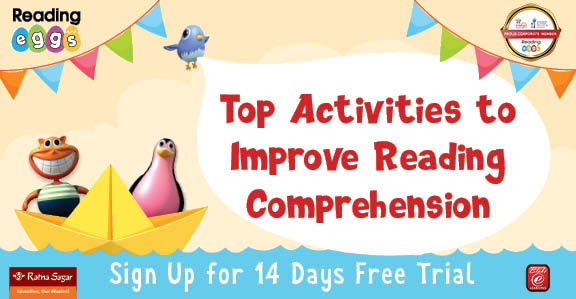Top Activities to Improve Reading Comprehension
Top activities to develop reading comprehension in early readers
Reading comprehension is a crucial skill of the English language. Even adults experience this issue with letters and sounds reading books for hours and are unable to recognise and understand the text. You may fluently read the written words but understanding and extracting meaning out of it can be a huge task. Whether you are a reader or at a beginner’s stage to learn to read, reading comprehension always helps you to understand books, newspapers, magazines and more complex literary texts. There are plenty of book exercises and worksheets created to teach reading comprehension to children, but these activities will sharpen the already adapted knowledge of your child. For toddlers who are still learning with letter and sound reading books, the following activities will help them in developing as well as improving reading comprehension:
- Start with the family of words
Word families are the words that are spoken in rhyme. For example, Sat, Mat and Cat create a word family. Now, introducing students to the word families is the first step towards kindergarten basic reading and memorising. In a way, they learn to read and speak multiple words by finding the pattern in the words. By any simple activity or song, the children can be taught the rhyming words.
- Word display
Children are very curious about small things. They observe, ask questions and create their perception of things around them. Well, to take advantage of this special ability of children, a simple exercise of putting words to display would do great good. It would add new words to their vocabulary. They will learn without realising that they are learning such an important skill of the language. This can be done by labelling things around them. For instance, ‘light’, ‘pen’, ‘blue’, the words attributed to their signifier so that the child sees and recognises the objects till they see them next time. A daily practice of 10-12 words will help enhance their vocabulary and they will remember the words in the long run as well.
- Phonemic awareness
Phonemic awareness involves learning the smallest sounds and how to employ them within a word while reading. These smallest sounds are composed of consonants, short vowels, digraphs and long vowels. These are important as they teach different letters and the sounds associated with them. With a good knowledge of phonemes, the child takes a great leap towards spelling and decoding words. An interesting approach that you can take for teaching phonics and phonemes is to address children one by one using their first name with missing initial sounds. Now, the task of the child is to figure out the missing sound. Children listen to their names more often and recognize the errors then and there. Reading Eggs is a comprehensive programme prepared by experienced experts and a group of academicians and the best choice of parents when it comes to improving and developing the reading skills of the child.
- Decoding games
Decoding is a way of sounding words out. As the child progresses with identifying sounds of each letter, group of letters, they will start with making complete words. To make it fun, you can incorporate games. This can be done by using little finger puppets for the students and asking them to wear them while pointing to the letters as they sound them out.
- Play sight words
Mostly sight words do not follow the rules of phonics. They are difficult to recognize. On the other hand, they are very easy to memorise because they are to be seen in texts more often. Now, this activity is ‘sight words catch’. In this activity, the children have to catch the word blocks one by one with a magnetic stick. This is similar to catching fish in water. The everyday reputation of this outdoor phonics game helps the children to become experts in remembering the sight words and reading them fluently.
- Open room for discussion
After kindergarten basic reading, it is very important to give children the space to think and put forward their views. This helps in enhancing their understanding of the text and the teacher or parent to assess their ability to interpret and decode. Ask simple questions like, “what do you think will happen next?” or “what will you do if you were in this character’s place?’’ This makes the child engage in the conversation and think critically. This allows him to resonate the text with practical knowledge. The Reading Eggs programme focuses on a core English language curriculum of skills and strategies essential for sustained reading and comprehension success. By incorporating Reading Eggs into your child’s daily routine, you will be helping to prepare them for the same structured learning they will need to succeed and feel confident at school. The programme unlocks all aspects of learning to read for your child by utilising the five essential skills of reading. The programme is interactive to keep children dedicated to their goals. When children start the programme, they can complete a placement quiz to ensure they are starting at the correct learning level. Parents can access detailed progress reports as well as hundreds of full-colour downloadable activity sheets that correspond with the lessons in the programme. The programme includes over 3500+ online books for children — each ending with a comprehension quiz that assesses your child’s understanding. You may sign up your child for a 14 days free trial of the Reading Eggs programme by clicking on this button below.
